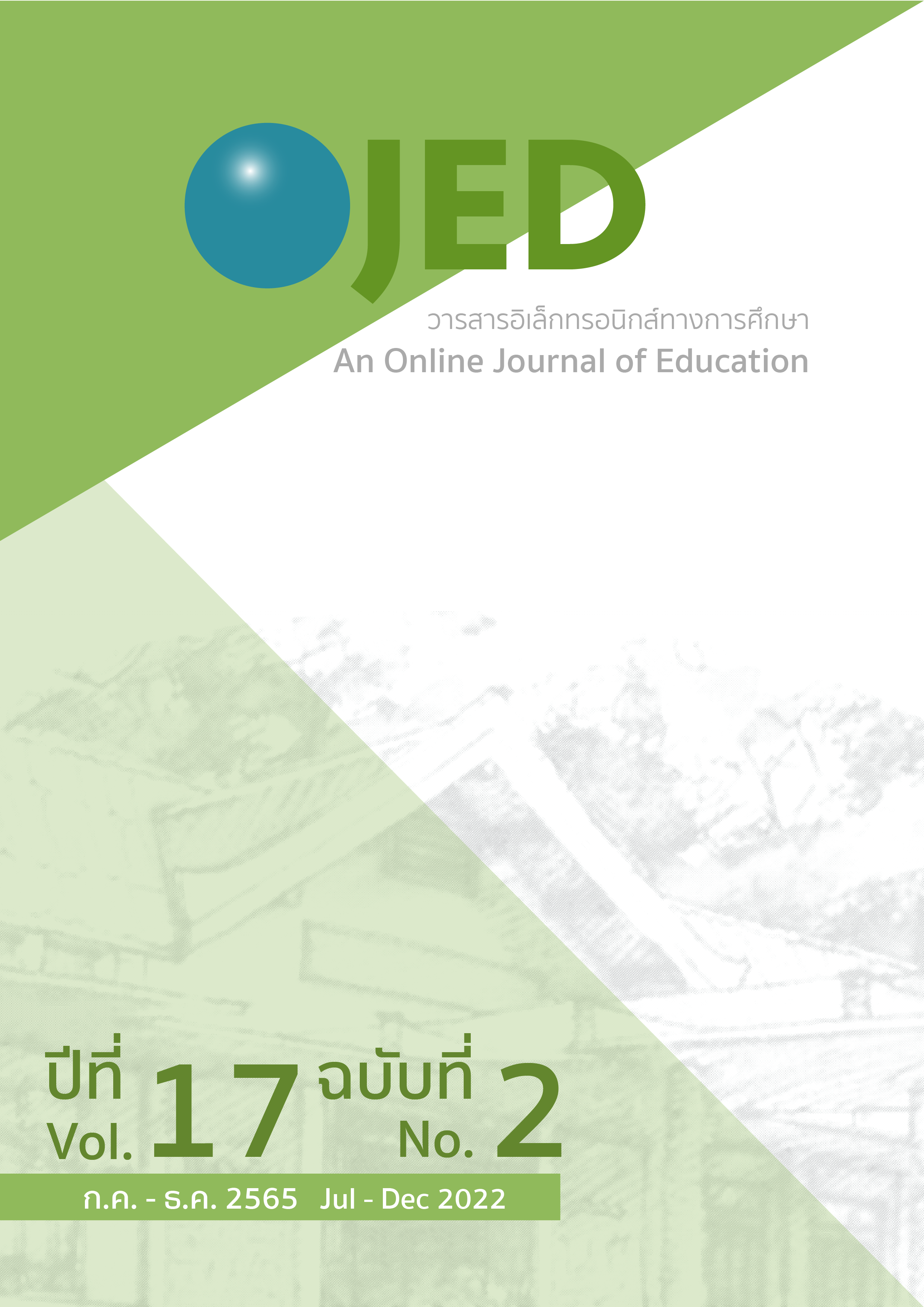Learning and Volunteer Motivation: A Study of Types of Learning that Motivate Volunteering
DOI:
https://doi.org/10.14456/ojed.2022.46Keywords:
motivation, type of learning, volunteerAbstract
This study aims to 1) investigate the motivations of volunteers for participation in volunteerism, 2) determine factors contributing to continued participation in volunteering activities, and 3) explore the types of learning that motivates volunteering. The sample group consisted of 223 Thai Red Cross Society volunteers aged 25 years and above who were officially registered for at least one year. The tools used in this study include questionnaire and interview forms while analyses were conducted using arithmetic mean, standard deviation and modified priority needs index (PNImodified). This study found that: 1) Volunteering programs that reflected personal values were ranked the highest as the motivation for participation in volunteerism (M = 4.67); 2) Related papers suggested that promotion of self-development through training on relevant knowledge and skills, as well as activities that match the volunteers’ competency help keep volunteers motivated, and 3) Participatory learning was ranked the first as the type of learning most needed among volunteers with PNImodified = 0.19.
References
เครือข่ายจิตอาสา. (ม.ป.ป). ฐานข้อมูลองค์กรเอกชน. Volunteerspirit Network. http://www.volunteerspirit.org/?placecategory=foundation
นิศาชล รัตนมณี และ ประสพชัย พสุนนท์. (2562). อัตราการตอบกลับของแบบสอบถามในงานวิจัยเชิงปริมาณ. วารสารมนุษยศาสตร์และสังคมศาสตร์ มหาวิทยาลัยธนบุรี, 13(3), 181-188. http://www.thonburi-u.ac.th/journal/Document/13-3/Journal13_3_16.pdf
บุญชม ศรีสะอาด. (2553). การวิจัยเบื้องต้น (พิมพ์ครั้งที่ 8). สุวีริยาสาส์น.
พรรณธิภา เอี่ยมสิริปรีดา, อัจศรา ประเสริฐสิน, และ นริสนา พึ่งโพธิ์สภ. (2561). แนวคิดและทฤษฎีในการศึกษาแรงจูงใจอาสาเพื่อการส่งเสริมการเป็นพลเมืองใส่ใจสังคม. วารสารวิชาการและวิจัยสังคมศาสตร์, 13(37), 1-16.
ภานุมาส มหาทรัพย์สกุล. (2555). ผลของการจัดกิจกรรมการเรียนรู้จากการปฏิบัติที่มีต่อจิตสำนึกสาธารณะของนักศึกษาการศึกษานอกระบบ [วิทยานิพนธ์ปริญญามหาบัณฑิต]. Chulalongkorn University Intellectual Repository (CUIR). http://cuir.car.chula.ac.th/handle/123456789/37625
สุพัตรา สุภาพ. (2536). เทคนิคการบริหารงานอย่างมีประสิทธิภาพยุคใหม่: เน้นพฤติกรรมมนุษย์. ธรรมนิติ.
สุวัฒน์ วัฒนวงศ์. (2547). จิตวิทยาเพื่อการอบรมผู้ใหญ่ (พิมพ์ครั้งที่ 2). บริษัทด่านสุธาการพิมพ์.
สำนักงานคณะกรรมการพัฒนาการเศรษฐกิจและสังคมแห่งชาติ. (2530). แผนพัฒนาเศรษฐกิจและสังคมแห่งชาติฉบับที่หก (พ.ศ. 2530-2534). https://www.nesdc.go.th/ewt_w3c/ewt_dl_link.php?nid=3781
สำนักงานคณะกรรมการพัฒนาการเศรษฐกิจและสังคมแห่งชาติ. (2560). แผนพัฒนาเศรษฐกิจและสังคมแห่งชาติฉบับที่สิบสอง (พ.ศ. 2560-2564). https://www.nesdc.go.th/ewt_w3c/ewt_dl_link.php?nid=6422
สำนักงานอาสากาชาด. (2563). รายงานประจำปี 2563 สำนักงานอาสากาชาด สภากาชาดไทย. โอ.เอส. พริ้นติ้ง เฮ้าส์ จำกัด. https://vb.redcross.or.th/wp-content/uploads/2021/04/ARSA-Annual-report-2563.pdf
Barnard, C. (1972). The functions of the executive (30th anniversary ed.). Harvard Press.
Clary, E. G., Snyder, M., Ridge, R. D., Copeland, J., Stukas, A. A., Haugen, J., & Miene, P. (1998). Understanding and assessing the motivations of volunteers: A functional approach. Journal of Personality and Social Psychology, 74(6), 1516. https://doi.org/10.1037/0022-3514.74.6.1516
Gilmer, B. von H. (1961). Industrial psychology. http://Hdl.Handle.Net/2027/Wu.89046870952.
Herzberg, F., Mausner, B., & Snyderman, B. (1993). The motivation to work. Transaction.
Knowles, M.S. (1950). Informal Adult Education. New York: Association Press.
Lindeman, E. C. (1926). Meaning of adult education. New Republic, Incorporated.
Merrilees, B., Miller, D., & Yakimova, R. (2020). Volunteer retention motives and determinants across the volunteer lifecycle. Journal of Nonprofit & Public Sector Marketing, 32(1), 25–46. https://doi-org.chula.idm.oclc.org/10.1080/10495142.2019.1689220
Putnam, R. (2002). Democracies in flux: The evolution of social capital in contemporary society. Oxford University Press. https://oxford-universitypressscholarship-com.chula.idm.oclc.org/view/10.1093/0195150899.001.0001/acprof-9780195150896-chapter-11
Sirota, D., Mischkind, L.A., & Meltzer, M.I., (2005). The enthusiastic employee: How companies profit by giving workers what they want. Pearson Education Inc.
Walton, R. E. (1973). Quality of working life: What is it. Sloan Management Review, 15(1), 11-21.
Yamane, T. (1973). Statistics: An introductory analysis (3rd ed.). Harper and Row Publications.
Yurdugül, H. (2008). Minimum sample size for Cronbach's coefficient alpha: A monte carol study. Eğitim fakü̧ltesi dergisi (H. U. Journal of Education), 35, 397-405.
Downloads
Published
How to Cite
Issue
Section
License
Copyright (c) 2022 An Online Journal of Education

This work is licensed under a Creative Commons Attribution-NonCommercial-NoDerivatives 4.0 International License.




